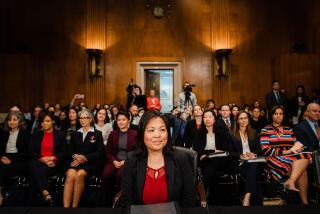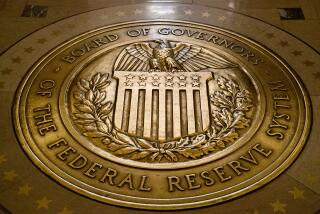Bernanke gets a second term as Fed chairman
Reporting from Washington — The Senate, putting market stability ahead of populist anger at Wall Street, voted Thursday to give Federal Reserve Chairman Ben S. Bernanke a second four-year term as head of the nation’s central bank.
The 70-30 vote was a hard-won victory for President Obama, who had lobbied senators who threatened to block the confirmation of a Bush-era holdover whom they considered an emblem of failed economic policy.
The bipartisan vote came three days before the expiration of Bernanke’s first term.
The margin of victory was the narrowest for a Fed chairman’s confirmation in the nearly century-long history of the central bank, reflecting intense public wrath in the wake of the worst economic crisis since the Great Depression and the resulting bailouts of giant financial institutions.
Fed nominees are rarely controversial. Until now, the most-contested Fed nomination was Paul Volcker’s 84-16 confirmation to a second term in 1983, after a deep recession.
Although Bernanke survived the politically charged debate on Capitol Hill, he faces tougher challenges as he begins his second term.
The congressional anger displayed in the run-up to the vote may spell trouble as Bernanke tries to beat back efforts in Congress to increase transparency and oversight of the Fed and its activities, including the institution’s setting of interest rates and other monetary policies.
Bernanke has repeatedly argued that such legislation would threaten the independence of the Fed, subjecting it to potential undue political influence.
Senate Banking Committee Chairman Christopher J. Dodd (D-Conn.) urged his colleagues Thursday to keep such policy questions at bay during the debate on Bernanke.
“If we need to reform the Fed, let’s reform the Fed,” Dodd said. But defeating Bernanke’s nomination would risk rocking the financial markets, Dodd said, and “would be beyond shameful. It would be the height of irresponsibility.”
Bernanke’s confirmation vote was preceded by a procedural vote to block a filibuster by opponents. That vote was 77 to 23. In the final vote, 22 Republicans joined 47 Democrats and one independent, Joe Lieberman of Connecticut, in supporting Bernanke.
California’s senators, both Democrats, split on the nomination, with Dianne Feinstein voting for Bernanke, and Barbara Boxer, who is up for reelection this year, voting against him.
Since Obama nominated Bernanke to a second term, critics have said that confirming him would mean a continuation of policies that ruined the economy.
Opponents in both parties said he and other federal regulators missed the warning signs of the credit crisis.
“By confirming Chairman Bernanke to a second term today, the Senate rubber-stamped a failed economic policy,” said Sen. Jim DeMint (D-S.C.). “Chairman Bernanke’s easy-money policy fueled the housing bubble, and his push for Wall Street bailouts made things worse.”
Beyond relations with Congress, Bernanke faces what is almost certain to be a highly contentious period for the Fed because of potential conflicts between its dual mandates -- to maximize employment and to maintain price stability.
In the months ahead, if the economy grows as slowly as many economists expect, political pressure will mount for the Fed to keep the pedal on monetary stimulus to boost employment.
But if the Fed keeps the accelerator down too long, the result could be serious inflation in the long term. With that in mind, financial conservatives will demand that Bernanke begin tightening credit, which tends to slow the economy.
It could be even more difficult for Bernanke and his colleagues to act independently if Congress expands its role in the Fed’s affairs.
It will be all the more challenging for Bernanke because he has overseen a Fed that has more than doubled the size of its balance sheet since the start of the credit crisis by pumping hundreds of billions of dollars into the financial system.
The measures have helped to stabilize financial markets and avoid a more severe recession, but they have left the central bank with the difficulty of withdrawing those hundreds of billions of dollars from the system without moving too fast or too slow.
Allan Meltzer, a professor at Carnegie Mellon University and author of “A History of the Federal Reserve,” said he did not have confidence that Bernanke and the Fed could pull it off.
As for political independence, Meltzer said Bernanke had already “given up most of it” by joining with the Treasury Department on emergency programs, including the bailout of American International Group.
More to Read
Get the L.A. Times Politics newsletter
Deeply reported insights into legislation, politics and policy from Sacramento, Washington and beyond. In your inbox three times per week.
You may occasionally receive promotional content from the Los Angeles Times.












